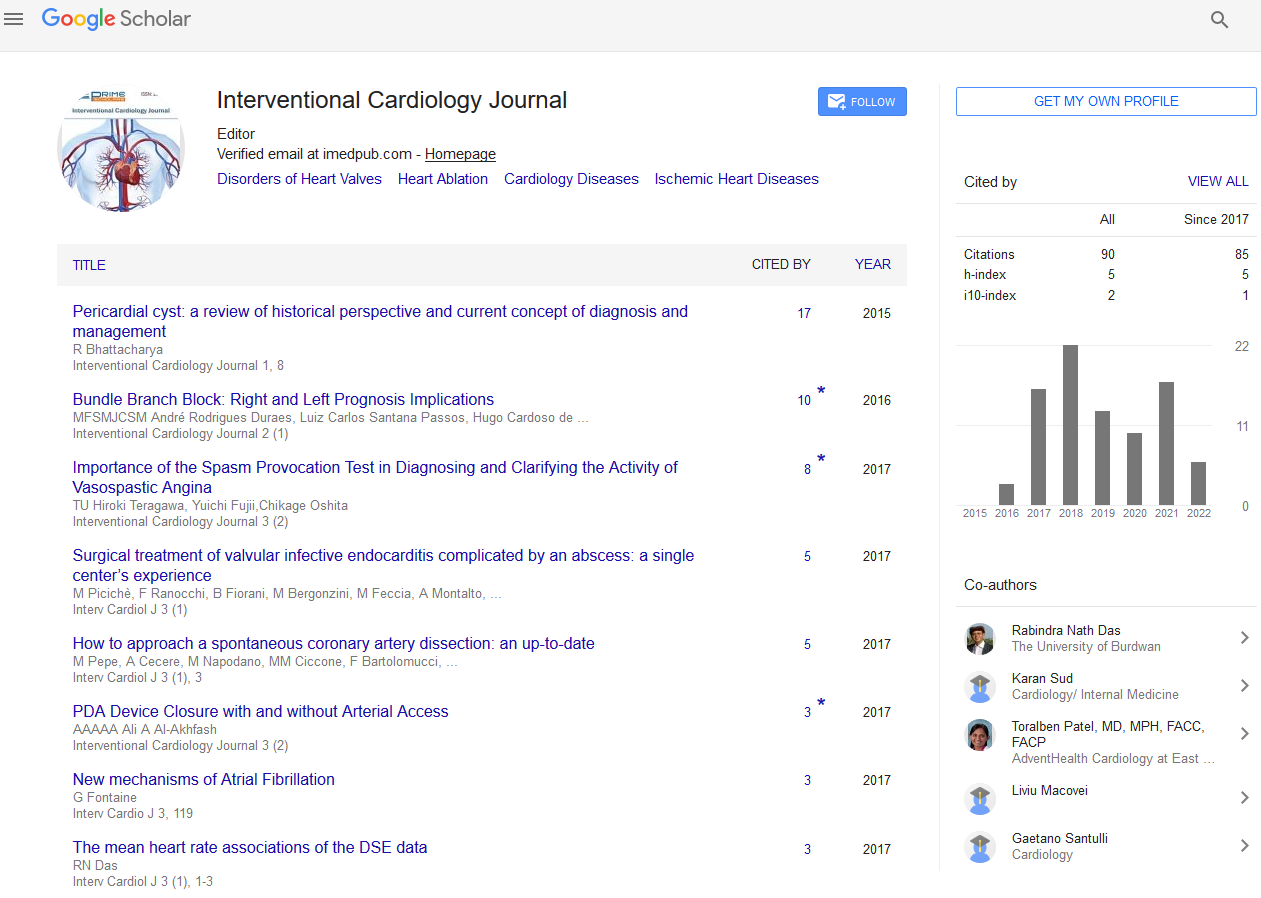Commentary - (2023) Volume 9, Issue 4
The Imperative of Cardiology Procedures: Safeguarding Heart Health and Beyond
Matthew Stark*
Department of Radiography, University of Biomedical and Allied Health Sciences, United Kingdom
*Correspondence:
Matthew Stark,
Department of Radiography, University of Biomedical and Allied Health Sciences,
United Kingdom,
Email:
Received: 29-Mar-2023, Manuscript No. IPIC-23-17371;
Editor assigned: 31-Mar-2023, Pre QC No. IPIC-23-17371 (PQ);
Reviewed: 14-Apr-2023, QC No. IPIC-23-17371;
Revised: 19-Apr-2023, Manuscript No. IPIC-23-17371 (R);
Published:
26-Apr-2023, DOI: 10.21767/2471-8157.9.4.38
Description
Cardiovascular Diseases (CVDs) remain a global health challenge,
claiming millions of lives each year and exerting a significant
burden on healthcare systems. The need for effective
prevention, accurate diagnosis, and targeted treatment strategies
for these conditions is paramount. This is where cardiology
procedures step in. These procedures are not merely
medical interventions; they represent a lifeline for patients,
providing essential insights, guiding therapeutic decisions, and
often serving as the key to restoring heart health. This article
delves into the compelling reasons behind the need for cardiology
procedures, highlighting their role in shaping patient care,
improving outcomes, and ultimately transforming lives. Cardiology
procedures play a pivotal role in diagnosing a myriad of
heart conditions, some of which may remain undetected without
advanced medical interventions Cardiology procedures offer
the means to identify CVDs at their earliest stages, when
symptoms might be subtle or absent. Early detection allows for
timely intervention, preventing disease progression and mitigating
potential complications. Certain heart conditions, such
as silent ischemia, may not present with recognizable symptoms
like chest pain. Procedures like stress testing and echocardiography
can uncover these silent threats, ensuring they are
addressed before causing significant harm. Accurate diagnosis
through cardiology procedures enables healthcare providers to
tailor treatment strategies to each patient's unique condition.
Personalized approaches based on diagnostic insights lead to
better outcomes and reduced risks of adverse effects. Cardiology
procedures help stratify patients' risk levels, guiding decisions
on treatment intensity, intervention timing, and the need
for preventive measures. This ensures that high-risk patients
receive the attention they require. Beyond diagnosis, cardiology
procedures are essential for guiding treatment decisions
and delivering precise interventions. Cardiology procedures
provide objective data that guide medical interventions, ensuring
treatments are rooted in scientific evidence and clinical
findings. Interventional cardiology procedures like angioplasty
and stent placement rescue patients from acute conditions
like heart attacks by restoring blood flow to blocked coronary
arteries. These time-sensitive procedures save lives and minimize
heart damage. Therapeutic cardiology procedures such
as pacemaker implantation, cardiac resynchronization therapy,
and heart valve repair or replacement significantly enhance patients'
quality of life, alleviating symptoms and enabling them
to engage in normal activities. Cardiology procedures provide
crucial information for developing individualized treatment
plans that address a patient's specific cardiovascular needs,
considering factors like comorbidities, lifestyle, and preferences.
Cardiology procedures identify risk factors like high blood
pressure, high cholesterol, and diabetes, prompting early intervention
and lifestyle modifications that prevent disease onset.
Procedures like stress testing help identify individuals who
may benefit from lifestyle changes, encouraging them to adopt
healthier habits that reduce cardiovascular risk. The precision
offered by cardiology procedures ensures that treatments are
targeted, minimizing unnecessary costs associated with ineffective
interventions. The imperative of cardiology procedures
cannot be overstated. From diagnostic precision to therapeutic
efficacy and preventive potential, these procedures are instrumental
in safeguarding heart health and enhancing overall
well-being.
Acknowledgement
None.
Conflict Of Interest
The author’s declared that they have no conflict of interest.
Citation: Stark M (2023) The Imperative of Cardiology Procedures: Safeguarding Heart Health and Beyond. Interv Cardiol J. 9:38.
Copyright: © 2023 Stark M. This is an open-access article distributed under the terms of the Creative Commons Attribution License, which permits unrestricted use, distribution, and reproduction in any medium, provided the original author and source are credited.

